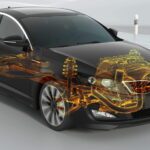We start with the damage to the environment, ie air pollution.
Fine dust and diesel seem to go hand in hand in recent years. The low emission zones that you are no longer allowed to enter with your old diesel car are starting to become law in every major city. But is diesel so harmful? The old diesels do not have a very good reputation, but several studies have already proven that the modern diesel engines do much better. Moreover, the modern diesel engine seems to emit less fine dust compared to a modern petrol car or a car running on CNG or natural gas.
With an emission of 1,500 particles per cm³, the diesel performed better than the CNG car (5000 per cm³) and the worst student in the class was the petrol car (15,000 per cm³) (Source: VRT news). In comparison, the older diesel engines regularly achieved an emission of more than a million parts per cm³, so one can speak of a spectacular gain. The new EURO 6 diesel engine has had to meet very strict requirements in recent years, which has resulted in a huge reduction in emissions. So it is not that the natural gas engine has deteriorated, but rather that the producers of the diesel engine have done their homework. But still, this fuel is not yet the most environmentally friendly
But of course there is not only particulate matter in the emissions, also nitrogen oxides.
There too, modern diesel does much better than their reputation suggests. But here all engines have improved enormously in recent years. The automotive sector with traditional combustion engines also realized that something had to change, especially with hybrid cars and electric cars lurking.
In addition, diesel engines have an additional advantage with AdBlue as an additive, this ensures that they eliminate nitrogen oxides almost completely or even completely in some engines. In petrol and gas engines, they work with a catalytic converter and other technology that ensures that nitrogen oxides are not the biggest problem here. The conclusion is therefore that the vehicles with the aforementioned combustion problems no longer have a major problem with the emission of hazardous gases.
What about Electric & hydrogen cars?
Although they have done their very best, a quantity of particulate matter and nitrogen oxides will always be released through the emissions of the combustion engines. Because by burning fossil fuels, you create a problem. Since electric cars simply do not emit nitrogen oxides and hydrogen cars only emit water, they naturally have a (small) lead. Nitrogen oxides are not used in these cars, you only have them when combusted at very high temperatures, which is something that does not occur with electric or hydrogen cars.
Don’t they produce particulate matter?
Since fine dust is not only released during combustion, but also when the tires wear out while driving, this is still a factor to take into account. And here the rule is, the heavier the car, the greater the wear. And let’s just say that electric and hydrogen vehicles are usually heavier than diesel, petrol or natural gas cars. The problem is that scientists are not sure whether the particulate matter emissions from tire and brake wear are just more or less than what comes out of the exhaust pipe of modern diesels.
Less harmful?
Some even suggest that these particles are much less harmful to your health. So more research needs to be done here. In addition, there are still uncertainties such as: what is the environmental impact of a battery, where does this power come from? Because if it comes from a coal-fired power station, this is of course a big difference with electricity that comes from green electricity. One thing is certain, emissions are getting cleaner all the time. The negative impact on air pollution and the environment is getting smaller and smaller. The real fight is with the car that is least damaging to global warming.
Which car has the most environmentally friendly fuel?
A car that emits the least greenhouse gases is the car that is best for the climate. The best-known greenhouse gas is of course CO2. This is a waste product that you get when burning fossil fuels, such as diesel, petrol and gas. The more CO2 your car pumps into the air, the worse it is for the climate. It is therefore a question of limiting the emission of CO2 and other greenhouse gases as much as possible. But where most articles talk about emissions while driving, we also have to check the whole picture. From the extraction of the fuels to the destruction of the car. In order to get a clearer picture of which car is the friendliest in the climate.
Build of the car
We start with the construction of the car and we look at how much CO2 is released. A simple rule to use here is the more complicated the car, the more CO2 emissions it entails. Given that electric cars and to a lesser extent hydrogen cars are much more complicated than your normal diesel, we can say that more CO2 is emitted during construction. Diesel and petrol cars are by far the easiest to make and therefore produce less CO2. Up to 60% more CO2 is involved in the construction of the average electric car than with a diesel car.
Fuel extraction
Here is one surprising clear big loser. Natural gas (CNG) is the big loser in the production of the fuel. Although CNG is a environmentally friendly fuel while driving, it’s a different story in mining. Natural gas consists of 80-90% methane, a greenhouse gas that is almost 30 times more aggressive than CO2. When drilling, transporting & processing there is always a part that leaks away. It used to be thought that this was only a limited part, but now it has been discovered that this is a lot higher than previously expected.
This depends from location to location, but it can leak from as much as 60% more to over 100% more. It is thought that about 2% of the total exploitation leaks during the whole process. And this is much more than first thought. Scientists have not yet fully decided, but they have completely lost the advantage that CNG cars have while driving and it may even be that they are more polluting than diesel or petrol. Electric cars seem to win the battle here completely, but here too we have to be careful. Much depends on how the electricity is made. Electricity from windmills, hydropower, solar panels and even nuclear power plants hardly causes CO2 emissions. If the electricity comes from coal-fired or gas-fired plants, this is a completely different story.
Consumption of the car
This is by far the best known piece of the story. And here it is also logical that an electric car and hydrogen car are the winners. They simply do not emit CO2. With conventional combustion engines, CO2 is released and CNG is clearly the best here. It can emit up to 20% less CO2 . If we look at recent engines, diesel comes in 2nd place here and with petrol you get the somewhat surprising loser. The latter is because there is more energy in a liter of diesel than in a liter of petrol. And CO2 emissions are directly proportional to consumption.
Maintenance and breakdown
Is less maintenance required on electric cars than on traditional cars? That is why they also come out as the winner here. In the event of demolition, you can then apply the same rule as for the construction of the cars, the more complicated the construction, the more CO2 for the demolition. So hydrogen cars and electric cars will again be the loser and will not be the most environmentally friendly fuel. Both cases are of course only one-time actions so this weighs less.
Are there any alternatives?
Recently MAES has introduced a new product HVO or Hydrotreated Vegetable Oil, a renewable diesel. HVO is a renewable diesel made from residual waste, which means that it has significantly less impact on our environment. It is a second generation biodiesel. The HVO is produced from various residual flows from the food industry. Meaning, not from food crops such as soya and palm oil. As a result, we can safely say that these products are produced much more sustainably and therefore much more favorable for the climate on our planet. You can simply add this to your diesel tank, but it is currently still a fairly expensive solution. This given that it is still a relatively new product without government support.
Conclusion
If we add everything up and we use green electricity, there is one clear winner. The electric car. You probably expected this, as we did. But the surprise isn’t in the winner, it is in the rest of the pack. And importantly the electric car is only the clear winner when you use green electricity. If you look at the total of environmentally friendly fuel, it would still probably win. Although by a far smaller margin. Second place is for the car on hydrogen. Then we can see a big gap. This is with the cars running on traditional fuels with a big surprise. This is namely the weak performance of cars running on natural gas.



